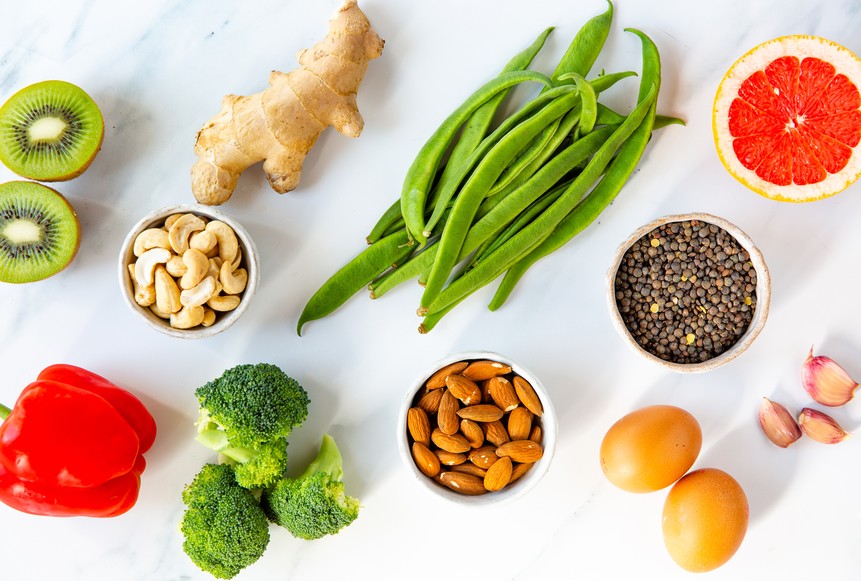I can’t tell you how many people I’ve encountered who think the word “postpartum” is…
Nutrition
Postpartum Mood Disorders Are Related to Nutrient Deficiency. What You Need to Know.
August 2, 2021 • By Natalie Renault

Studies conducted during the Covid Pandemic indicate that close to 70% of mothers are experiencing perinatal mood and anxiety disorders (PMADs). 70 freaking percent!
When you look at all of the changes and challenges that come with the postpartum period, it’s no wonder so many new moms find themselves drowning in anxiety and depression. Radical hormonal shifts, physical pain with healing, a complete change in identity, and sleep deprivation create the perfect storm for mental and emotional instability.
It’s a lot. And a variety of factors are at play influencing how freshly postpartum people fare after baby.
One is the lack of practical, social, financial, and emotional support for mothers in the United States and elsewhere. There is a lot of work to do in policy and politics to change this (you can read about 7 organizations doing incredible work right now here). Another is the severe lack of knowledge about how nutrition can support maternal mental health.
Many of the nutrients we are deficient in before pregnancy, lose during pregnancy, and become even more deficient in postpartum are connected to our mental health. We already know that vital nutrients are preferentially transferred to your baby in utero and that continues if you choose to breastfeed.
After childbirth, nutritionally speaking, we need to account for blood loss and healing wounds such as vaginal and perineal tearing, cesarean site, and the internal wound left behind by the placenta. And we can support uterine remodeling as it shrinks back to its pre-pregnancy size and help heal our connective tissue and skin elasticity.
These physical traumas, paired with the emotional, are the most nutritionally demanding events in a woman’s lifetime. And research shows us that there is a direct correlation between postpartum depletion and maternal depression.
Pregnancy, birth, and lactation deplete nutrients essential to the neurotransmission systems involved in mood regularity, management of stress response, and greater resilience.
When biochemical reactions lack nutrients to make the building blocks of these neural pathways, the nervous system begins to compensate. In time, this shows up as neurological or psychological symptoms.
I know, the postpartum forecast is looking gloomy, but there is good news, I promise.
The foods you eat can also be powerful building blocks for restoration. A diet rich in whole foods, vitamins, minerals, and functional amino acids will help replenish nutrient stores lost during pregnancy, birth and lactation, and support balancing your brain and mood stability.
6 nutrients to support your mood:
Omega 3 fats (especially DHA)
While omega 3s are best known for their role in brain development and their ability to improve cognitive function, they remain crucial in the postpartum period. Replenishing your body’s stores that were heavily taxed in pregnancy and breastfeeding. There is a direct association between a low Omega-3 index in pregnancy and high score on the Edinburgh Postnatal Depression Scale (EPDS).
Focus on consuming fatty fish such as salmon, sardines, anchovies or mackerel, and grass-fed beef. Note that marine algae is the only reliable plant-based source of DHA. Aim for three servings of fatty fish per week, otherwise supplementation is recommended.
Vitamin D
Low levels of vitamin D level are associated with depressive symptoms. On the flip side, adequate Vitamin D intake through food sources, safe sun exposure, and/or supplementation, can have a protective effect.
Foods to focus on include wild-caught fatty fish such as salmon, sardines, anchovies, and mackerel (which are also high in omega 3’s so bonus!). Also, pasture-raised eggs (particularly the yolk), beef liver, and pork.
Iron
Iron deficiency has cumulative effects over time impacting maternal mental health, memory, and cognitive function.
Heme sources are most absorbable and found in grass-fed red meat (especially organ meats), dark meat poultry as well as oysters, clams, and sardines. Check out this Iron building power smoothie.
B-vitamins
B-vitamins are important for memory, energy, and stress resilience. While the studies on the relationship between B-vitamins and PMADs are limited, depression has been linked to low levels of B vitamins, specifically B9 (folate).
Some top sources of B-vitamins include grass-fed meat (especially liver), seafood, pasture-raised eggs, poultry, quality dairy products, as well as legumes, leafy greens, and seeds.
Magnesium
Magnesium plays a role in psychiatric symptoms like depression and behavioral disturbances. It is required in larger quantities during pregnancy and lactation. Since it is not stored in the body, consistent daily intake is recommended.
The best food sources of magnesium are seeds, especially pumpkin, sunflower, and chia, almonds and brazil nuts, as well as oats, cacao powder, avocados, and leafy greens. You can try this Postpartum Aid for hydration with your magnesium and these Cacao Almond Butter Snack Bites for a little bit of everything.
Probiotics
Your gut microbiome is responsible for making 95% of the mood-stabilizing neurotransmitters in the body. Read that again. 95%!!! Improving the status of your gut can greatly enhance the function of your brain and, ultimately, your entire body. The best way to support your gut health with food is eating traditionally fermented foods, beverages, and fermented dairy.
Foods like sauerkraut, kimchi, traditional pickles, other fermented vegetables, plain organic yogurt, kefir, kombucha, and beet kvass. Naturally fermented foods often contain a wider variety of strains of good bacteria than probiotic supplements, and additional supplementation isn’t a bad idea.
The quality of your nourishment impacts not only your physical health, but also your mental health. (Read more about the importance of prioritizing your nutrition postpartum here). While nutrition is certainly not the “end all be all” for postpartum mental health, it is often overlooked as an avenue to support and complement conventional treatment with therapy and medication.
It’s always a good idea to plan your postpartum recovery meals ahead of time if you can because once the baby’s here, all bets are off. But it’s never too late. Check out our ever-growing nutrition and recipe resources here and send them to a friend, your partner, family member, or neighbor to make for you!
Want more guidance on PMAD? Check out this article that talks more about how postpartum depression and anxiety don’t always look how you expect. And this one that addresses a symptom of PMAD no one talks about.
And if you are looking for support around your mental health these resources can be a great place to start:
You are not alone and your emotional and mental health are important. You are safe to ask for support when you need it. And on your own, food is a great place to start.


